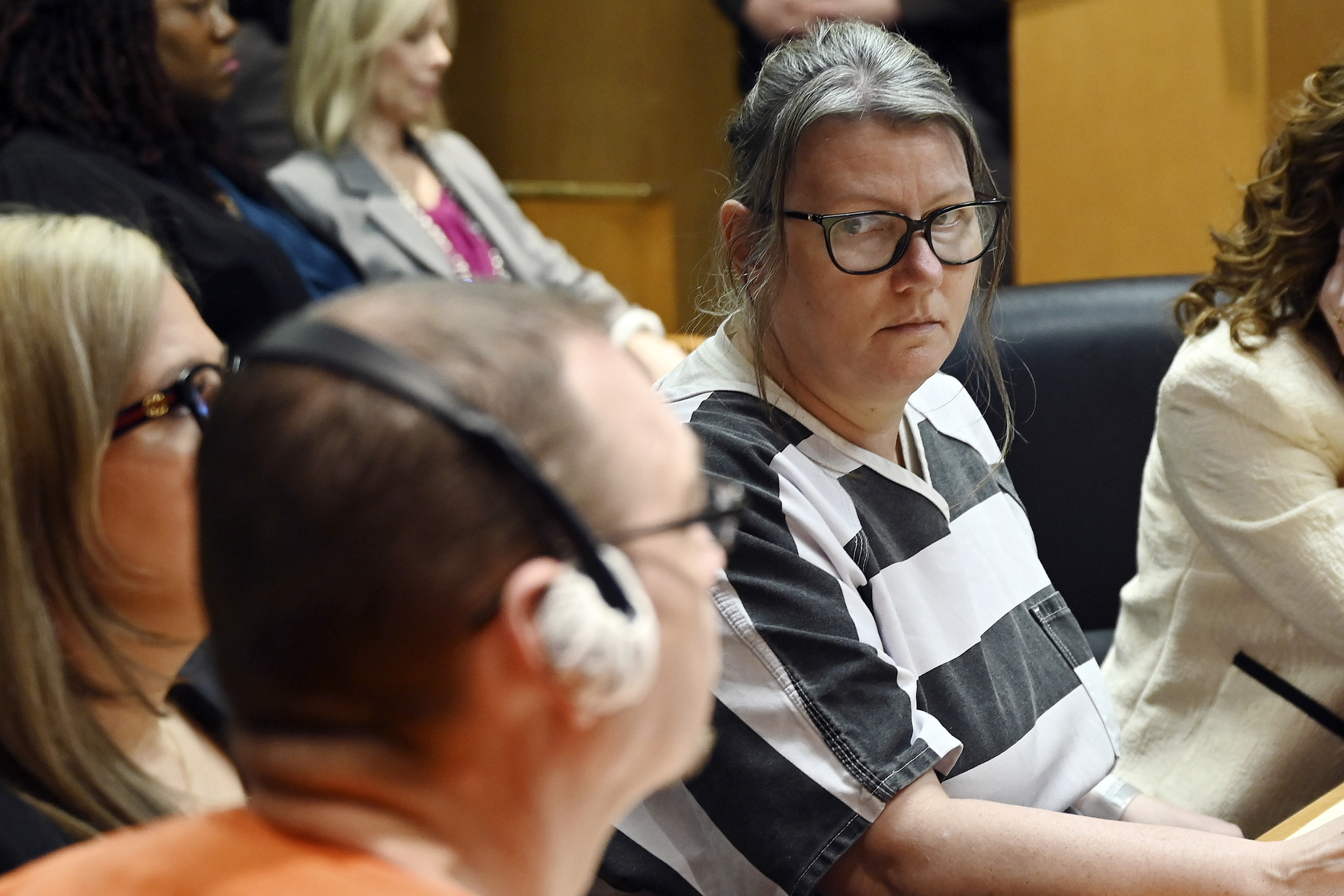Why parents are being punished for the crimes of their children

Jennifer Crumbley stares at her husband James Crumbley during sentencing at Oakland County Circuit Court on April 9 in Pontiac, Michigan. They were each sentenced to at least 10 years in prison for failing to take steps that could have prevented the killing of four students in 2021. (Clarence Tabb Jr./Detroit News via AP)
Parental responsibility is being put to the test.
In April, James and Jennifer Crumbley were sentenced to 10 to 15 years in Michigan prisons after their son, Ethan, 15, gunned down four classmates and wounded six others. Having purchased a gun for their son despite numerous warning signs that he was unwell, including concerns raised by school officials, the Crumbleys were charged with gross negligence leading to involuntary manslaughter and convicted of involuntary manslaughter.
A similar fate fell upon Robert Crimo Jr., the father of accused Highland Park shooter Robert Crimo III. Crimo was accused of reckless conduct after he helped his son get a firearm owner’s ID.
The big question now remains: Where is the line, and how much parental nudging is too little?
Parental responsibility laws aren’t new. Most states have a form of this law, which holds parents or legal guardians responsible for theft, shoplifting and property damage. Most states have a financial limit on the damages owed by a parent. For example, parents may be liable for up to $25,000 per incident of their child’s willful misconduct in California. And in Ohio, you can sue a parent for up to $10,000 if it’s proven that their child willfully and maliciously assaulted someone in an incident likely to product bodily harm.
Technically, the Crumbleys weren’t prosecuted for their child’s crimes. Rather, under Michigan’s involuntary manslaughter statute, they were prosecuted for their own acts: Purchasing their emotionally disturbed son a handgun, and failing to secure the gun in a way that their son or another person could not use it, says Frank Vandervort, clinical professor of law at University of Michigan Law School. Under this Michigan statute, when a person owes a legal duty to another and fails to perform that duty or performs it negligently, and those failures directly result in another’s death, they may be held criminally responsible for involuntary manslaughter.
Vandervort says legislatures and courts across the country and for decades have deemed that in some circumstances, parents should be held accountable for the criminal acts of their children, at least to some degree.
Charging and jailing parents for their child’s crimes, however, is relatively uncharted territory that could have major legal consequences.
“What I think is unusual about the Crumbley parents’ cases is the severity of the charges that the prosecution brought,” says Vandervort says. In most instances, Vandervort says, contributing to the delinquency or similar charges are misdemeanors or lower level felonies. For example, in the Highland Park shooting, the father was charged with reckless conduct, which upon his plea of guilty, netted him 60 days in jail and 2 years of probation.
Sins of the parents
The general rule is that one person is not liable for the acts of another. But when there is a special relationship with the child or a chord party (in this case, it was Ethan Crumbley and the four executed children he killed), then someone (Crumbley parents) may have a responsibility to intervene.
“If this duty exists and the parent does not discharge that duty in a non-negligent manner, they may be held liable,” Vandervort says. “In the Crumbley parents’ cases, the law is that they had a duty to each of the deceased children, a duty they were negligent in discharging.”
There is no clear line, however, and parent liability varies by the situation: Did the parent encourage the crime, provide the means or ignore clear warning signs? asks David Moorhead, managing partner of The Moorhead Law Group in Colorado. The twist is that criminal law focuses on holding people accountable for controllable actions, not with predicting the future. But a parent’s neglect of known warning signs, such as violent threats or dangerous fixation, can create a foreseeable risk of criminal behavior, justifying potential charges for criminal negligence, Moorhead says.
One thing that’s important to distinguish is that the Crumbley prosecutor decided to charge the parents with involuntary manslaughter based on gross negligence of not preventing the crime and by providing Ethan Crumbley with a gun, says Eve Brank, the director of the Center on Children, Families and the Law, and professor of psychology of law at University of Nebraska-Lincoln. If this were a parental civil liability case, then parents are strictly liable, she says, which means their intent or state of mind is irrelevant. If we’re talking about contributing to the delinquency of a minor, then the state statute would define the requisite mental state for parents.
“For the Crumbley case, the court applied the requirements from the involuntary manslaughter statue,” she says, explaining that the statue supports their parental liability.
Future cases
While these are difficult to predict, Brank says the Crumbley case opens an avenue for charging other parents for involuntary manslaughter. It’s unlikely, however, that the irresponsibility displayed by the Crumbleys will be repeated so frequently as to lead to a new spate of involuntary manslaughter charges across the country, he argues.
“But the guilty verdicts nevertheless send a strong legal and moral message to gun owners and parents: You have a responsibility to prevent children from gaining unsupervised access to guns and the failure to act prudently can lead to both tragedy and criminal charges,” says Nick Suplina, senior vice president for Law and Policy of Everytown for Gun Safety in New York.



